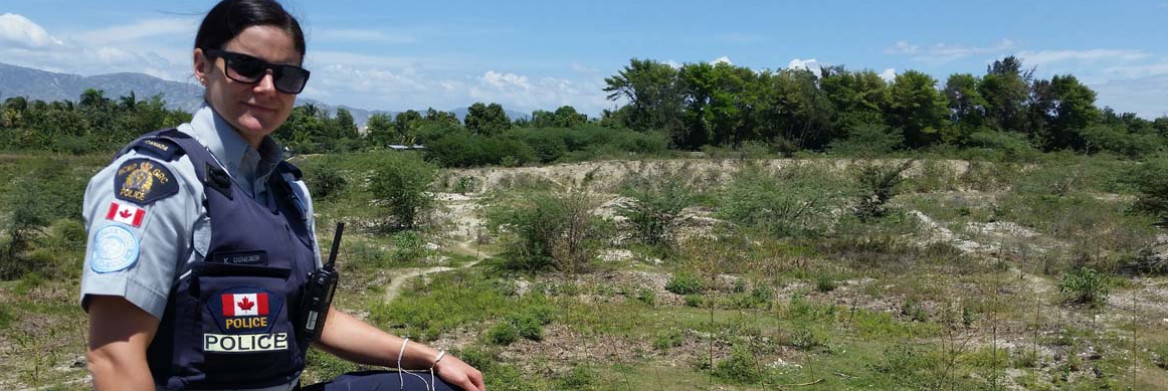RCMP personnel work out of more than 700 detachments in 150 communities in every part of the country. They also participate in efforts that help people far beyond Canada's borders.
More than 4,000 police officers from the RCMP and other Canadian agencies have contributed to peacekeeping missions around the globe, facilitated through a partnership with Public Safety Canada and Global Affairs Canada. These missions have spanned 33 nations including Sudan, Kosovo, West Bank, Mali, and Afghanistan.
Canadian police officers serve in many roles abroad, depending on the mission. Their work can include training, mentoring and monitoring, supporting election security, investigating human rights violations, and responding to humanitarian crises.
Serving on a mission is a way for police officers to contribute to public safety in unstable countries and learn from new experiences. The largest international civilian police engagement has been in Haiti, which represents nearly two-thirds of all Canadian police peace operations deployments.
Precise Planning
In the aftermath of the devastating 2010 earthquake, hundreds of thousands of Haitians were left homeless and forced to relocate to camps for Internally Displaced Persons (IDP).
"Going to Haiti was a life changer," says RCMP Cpl. Kim Deniger, who spent a year in the United Nations (UN) mission there in 2015. "The work we did, the people we met, it gave me a totally different perspective on how others live, and a new appreciation for life in Canada."
Deniger's decision to apply for the international deployment wasn't made in haste. At the time, she was separated, with three children under the age of eight. "I really wanted to prove to my kids that anything is possible," she says. "As a mother, to be able to give them the opportunity to learn how to be independent and more self-reliant was the best gift I could've given them. I put a lot of planning into it and had an amazing support network."
Before leaving, she wrote 365 letters to her kids – one for each day she would be away.
Going operational
After a month in an administrative role, Deniger asked to be reassigned to front-line patrol duties. She was appointed as a Team Leader for an Internally Displaced Persons camp at Croix de Bouquets northeast of the capital, Port-au-Prince.
"I saw firsthand the challenges the local people were dealing with and it was tough to witness that, especially the children," Deniger recalls.
Working with local authorities and UN police officers from several other countries, Deniger helped provide food and clean drinking water to the camp. They distributed sports equipment and made weekly visits to the local orphanage, while spearheading their own fundraising campaigns with friends, family, and colleagues at home.
"The biggest takeaway was the realization that trying to solve a problem 'the Canadian way' isn't necessarily the best way," says Deniger. "It's really important to listen and learn from the local community to figure out the solution that's going to work for them in their context. I learned the value of being open-minded, flexible and resilient."
Inspired by her experience in Haiti, Deniger signed up for another one-year United Nations mission in the West African country of Mali in 2019. She's planning to apply for a third when her kids are older.
"These experiences have taught me a lot about the value of community-oriented policing and so much more," she says. "I've learned the importance of being in the moment, of being patient, and appreciating all that we have in Canada. I'm so proud to be Canadian and to be a member of the RCMP."
